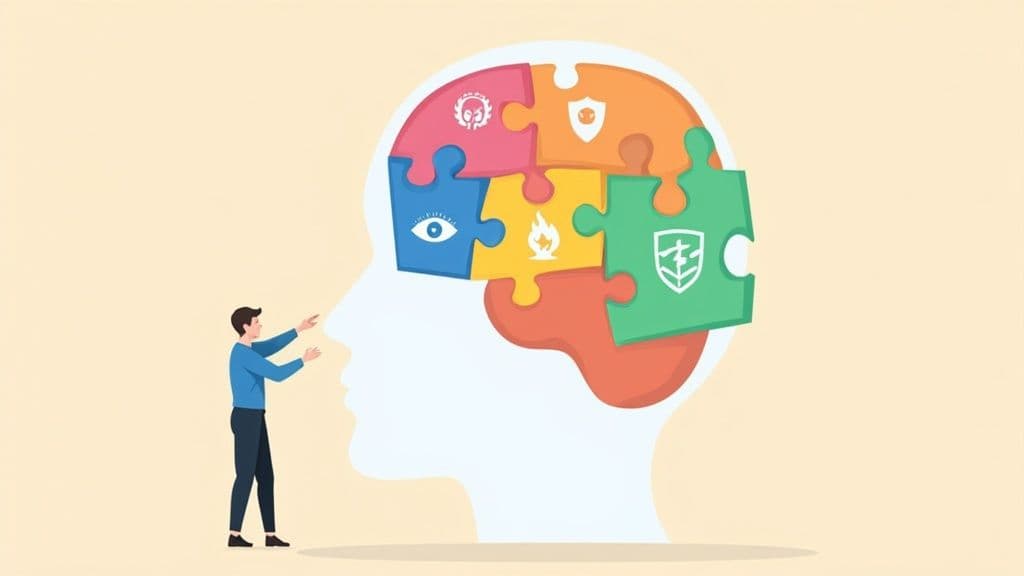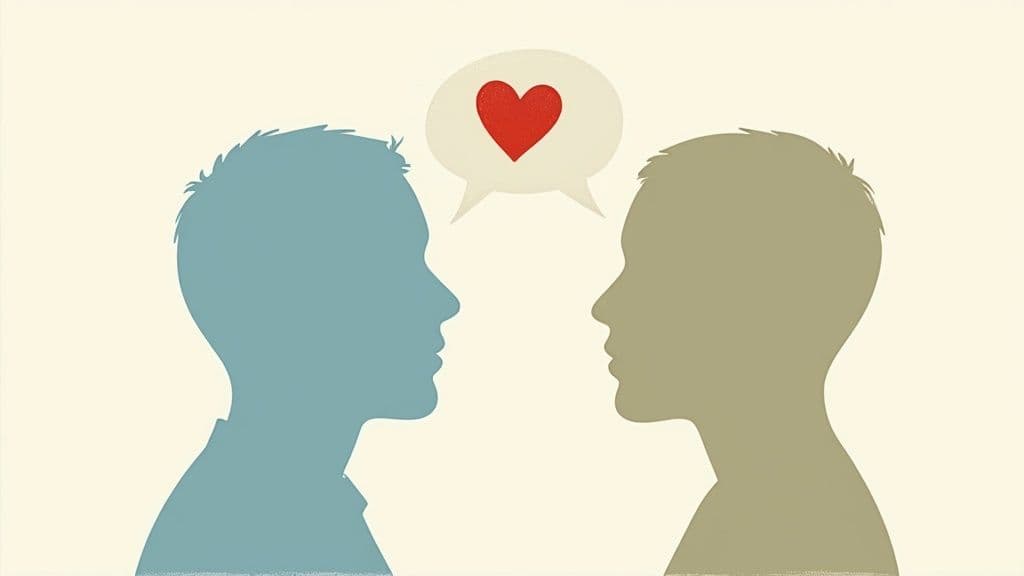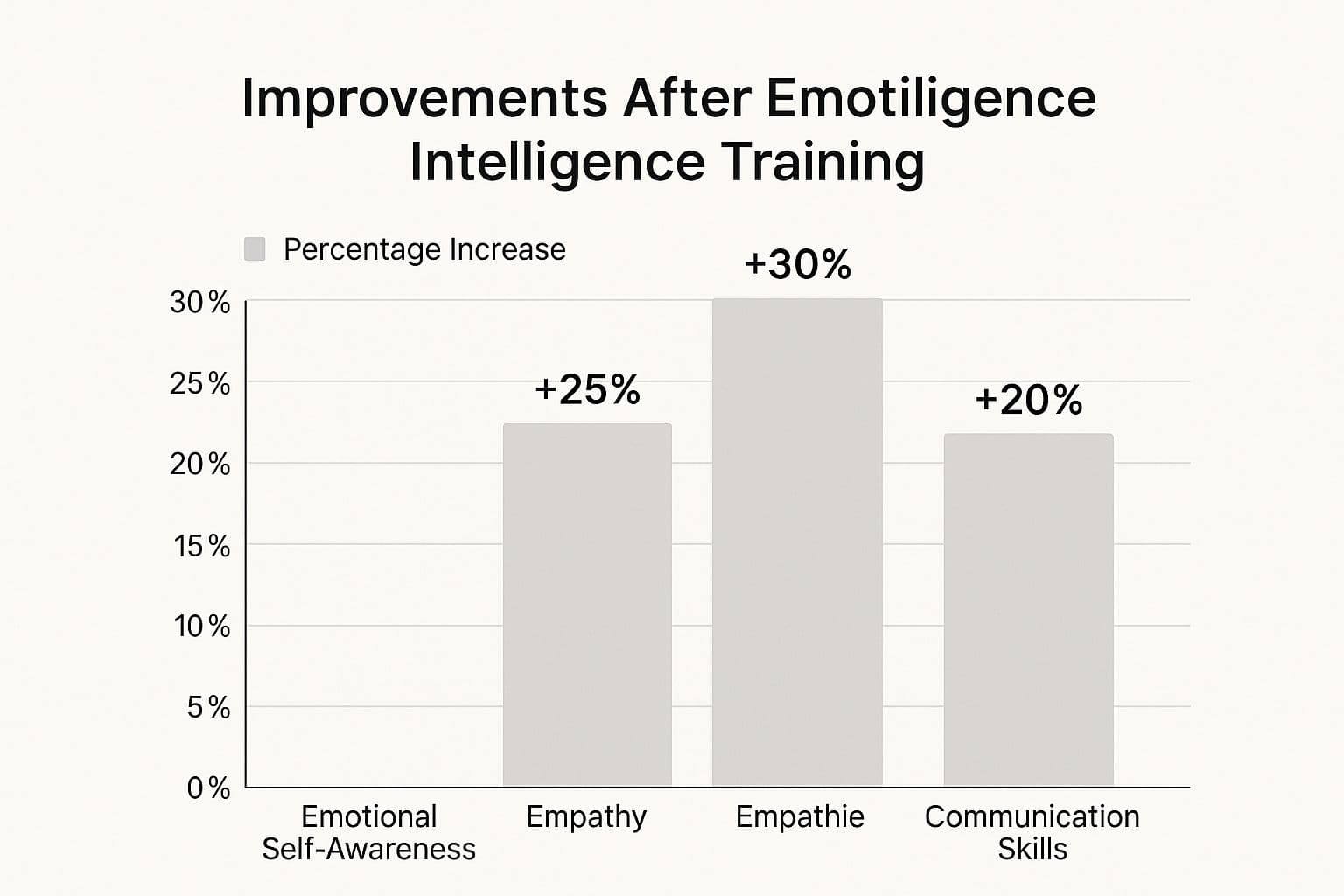Emotional intelligence (EQ) is a set of learnable skills you can strengthen through short daily habits. This guide offers research-informed exercises—self-awareness, regulation, empathy, motivation, and social skills—that you can use now to improve decisions, relationships, and resilience.
August 27, 2025 (6mo ago) — last updated February 20, 2026 (7d ago)
Build Emotional Intelligence: Practical Guide
Short daily habits and research-backed exercises to boost self-awareness, regulation, empathy, motivation, and social skills for better relationships and resilience.
← Back to blog
Build Emotional Intelligence: Practical Guide
Learn actionable habits and short exercises to strengthen self-awareness, emotional regulation, empathy, motivation, and social skills. Start applying them today to make better choices, improve relationships, and increase resilience.
Introduction
Emotional intelligence (EQ) is a set of skills you can learn and strengthen with regular practice. This guide gives clear, research-informed habits and short exercises you can start using today to notice feelings, respond instead of react, and build stronger relationships. Focused practice can produce measurable gains within weeks for many people2.
What Emotional Intelligence Means for You

Emotional intelligence is the ability to notice emotions, understand why they arise, and see how they shape actions and relationships. Developing EQ lets you manage emotions instead of being driven by them, which improves decision-making, job satisfaction, and resilience. The modern concept of emotional intelligence reached a wide audience through Daniel Goleman’s work1.
Think of a manager with high EQ who walks into a tense meeting, senses the room’s frustration, and guides the conversation toward a solution rather than escalation. This guide is a practical roadmap to building that skill set.
The Five Pillars of Emotional Intelligence
To grow EQ, focus on five core skills:
- Self-awareness: Recognize your emotions and how they affect your choices.
- Self-regulation: Pause and choose a response instead of reacting impulsively.
- Motivation: Use emotions to fuel pursuit of meaningful goals.
- Empathy: Understand others’ feelings from their perspective.
- Social skills: Communicate clearly, build rapport, and manage relationships.
The goal isn’t to suppress feelings but to listen to them and use that information to make wiser choices.
Building Your Foundation: Self-Awareness

You can’t manage what you don’t understand. Self-awareness means naming emotions precisely and tracing them back to triggers. Practicing this habit turns vague moods into useful data. Neuroscience and training studies show that deliberate awareness practice can change brain systems involved in emotion processing and increase emotional skills over time2.
Daily Emotional Check-In
Create a daily pause. Ask, “What am I really feeling right now?” and name the emotion precisely. Then ask, “What triggered this?” Identifying triggers connects emotions to events and gives you options for responding.
Journaling to Uncover Patterns
Journaling helps reveal repeated emotional patterns without long entries. Try this short format:
- Note one or two key events from the day.
- Record your primary feelings.
- Reflect briefly on how you reacted.
After a few weeks you’ll spot trends—for example, feeling defensive during feedback or dreading Sunday nights. Recognizing patterns is the first step to changing automatic responses. For more on self-awareness practices, see our guide on self-awareness exercises.
Self-awareness isn’t about judging yourself; it’s about curiosity. Treat each emotion as information about what matters to you.
Connect Feelings to Purpose
When emotions signal misalignment—frustration or boredom—you can use that signal to reconnect with purpose. Frameworks for life-purpose work can add clarity about strengths and values. The Life Purpose App offers structured exercises to help you explore this connection. Complement self-work with mind-body techniques to support emotional balance and clarity2.
From Reaction to Thoughtful Response

Self-regulation creates a small gap between a trigger and your action. That pause lets reason catch up with feeling and gives you a chance to choose a better response.
The Pause and Plan Method
When strong emotion surfaces, take one deliberate breath. During that pause, ask:
- What’s the most helpful way to react right now?
- Will my first impulse get the result I want?
- What would a calmer, more constructive response look like?
This habit moves you from being a passenger to being the driver of your emotional life.
Self-regulation isn’t about suppressing feelings. It’s about redirecting their energy toward useful outcomes.
Reframe Negative Thoughts
Many strong reactions come from the stories we tell ourselves. Cognitive reframing helps challenge automatic negative thoughts. If a coworker dismisses your idea, instead of thinking, “They think I’m incompetent,” try, “They may see it differently—let me ask for their perspective.” Reframing reduces reactivity and opens constructive dialogue. For deeper strategies on limiting beliefs, see our guide on overcoming limiting beliefs.
Building Bridges: Empathy and Social Skills
Once you’ve developed awareness and regulation, turn outward. Empathy and social skills transform internal insight into stronger relationships. Empathy is understanding another’s feelings from their viewpoint. Social skills are how you use that understanding—listening, giving feedback, and building trust. Training programs show measurable gains in empathic ability for many participants3.

See from Their Perspective
In a tense conversation:
- Pause your own argument and listen.
- Ask open questions like, “Help me understand why that part matters to you.”
- Summarize what you heard, for example, “So you’re feeling frustrated because you don’t feel heard—do I have that right?”
This isn’t about agreeing. It’s about showing you’re trying to understand. That alone often shifts the dynamic and builds trust.
“Empathy is about finding echoes of another person in yourself.” — Mohsin Hamid
Grow Your Social Toolkit
With empathy as a base, practice social skills in everyday moments. When giving feedback, open with genuine appreciation before discussing improvement. That turns confrontation into coaching. A higher-EQ approach leads to better collaboration and stronger teams, improving workplace outcomes4.
Fueling Drive with Motivation and Optimism
Motivation converts emotion into sustained effort toward meaningful goals. When work connects to a deeper why, motivation becomes self-sustaining.
Reframe Failure as Feedback
People with high EQ separate the sting of failure from the lesson it offers. After a setback, ask what you learned and what you’ll try differently next. That mindset turns dead ends into launchpads for growth.
Find Your Why and Practice Self-Compassion
Link daily goals to core values to sustain long-term effort. Practice self-compassion to reduce the harsh inner critic that saps motivation: acknowledge effort and celebrate small wins.
Weaving EQ into Everyday Life
Learning about EQ is one thing. Living it is another. Small, consistent practices create meaningful change over time. The goal is consistency, not perfection.
Create a Weekly Practice Plan
Use this simple weekly rhythm to build the core skills:
- Mindful Monday (Self-Awareness): Five-minute emotional check-in before your day starts.
- Thoughtful Tuesday (Self-Regulation): Practice a pause before responding in one conversation.
- Empathy Wednesday: Commit to one conversation where your only goal is to understand.
- Social Skills Thursday: Offer specific, sincere praise to a colleague.
- Feel-Good Friday (Motivation): Acknowledge one win from the week.
A lifelong practice begins with a single day. Start with one small action and build from there.
Ready to connect daily actions to purpose? The Life Purpose App offers a framework for self-discovery based on Dan Millman’s work. Download the app to begin.
Common Questions (Concise Answers)
How long before I see improvement?
With consistent daily practice and focused training, many people notice measurable changes in weeks, especially in self-awareness and regulation2.
What habit gives the best return on effort?
A five-minute daily emotional check-in. It builds self-awareness and becomes the foundation for regulation, empathy, and motivation.
How can I practice empathy when I’m busy?
Use quick perspective-taking: pause, ask one open-ended question, and paraphrase what you heard. Even brief, genuine listening builds trust.
Discover Your Life Purpose Today!
Unlock your true potential and find your life’s purpose.
